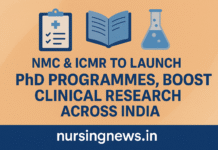New Delhi, India – October 28, 2024 — The Indian Nursing Council (INC) has unveiled a landmark initiative aimed at transforming healthcare delivery and enhancing nursing specialization through three highly targeted Nurse Practitioner (NP) residency programs in Anesthesia, Nephrology, and Pediatric Nursing. This ambitious program aligns with India’s National Health Policy (NHP) of 2017, which highlights the importance of a skilled healthcare workforce capable of providing specialized care in response to the nation’s rising health demands. With public comments invited until November 7, the INC is working toward a national-scale nursing upgrade, empowering nurses to meet the diverse, urgent needs of India’s healthcare system.
Each of these programs offers a structured path for nurses to advance their knowledge and skill set, allowing them to practice at an elevated level under physician oversight and enhance patient care across various specialties. Through the Nurse Practitioner in Anesthesia (NPA), Nurse Practitioner in Nephrology Nursing (NPNepN), and Nurse Practitioner in Pediatric Nursing (NPPN) programs, the INC aims to address critical workforce gaps and enhance care quality in underserved areas.
A Shift Toward Specialized Nursing Practice
The INC’s specialized NP programs mark a significant shift in nursing education, placing a strong emphasis on competency-based training and clinical residency. This residency model, which incorporates up to 85% hands-on clinical training and 15% theoretical instruction, prepares nurses to provide safe, effective, and autonomous care in critical areas traditionally overseen by physicians. According to the INC’s regulations, each program requires a two-year commitment, during which participants engage in extensive practical training under the supervision of qualified preceptors.
In addition to clinical expertise, the programs also cultivate leadership, research, and educational competencies, empowering nurses to assume roles as managers, educators, and clinical consultants within their specialty. Upon completion, NP graduates are expected to elevate healthcare outcomes, particularly in regions with limited access to specialized services.
1. Nurse Practitioner in Anesthesia (NPA) – Enhancing Surgical and Critical Care
The NPA program responds to India’s critical shortage of anesthesia providers, a challenge underscored by the Lancet Commission on Global Surgery (LCoGS), which advocates for a threshold of 5000 surgical procedures per 100,000 people by 2030. Safe and accessible anesthesia services are essential to achieving this goal, yet an estimated 66% of patients in low- and middle-income countries lack access to primary surgical care. Addressing this gap, the NPA program trains registered nurses to provide peri-anesthesia care, equipping them with the skills to prepare, manage, and stabilize patients undergoing surgery and other medical procedures.
Program Highlights
The NPA program encompasses a comprehensive curriculum focused on anesthesia nursing practice. It includes training in advanced pathophysiology, pharmacology, and clinical assessment, alongside hands-on practice in operating rooms, intensive care units (ICUs), emergency departments, and other critical care settings. Some key competencies include:
- Pre-Anesthetic Assessment and Planning: NPA trainees learn to assess patients’ readiness for anesthesia, identify risks, and develop personalized care plans to ensure safe surgical outcomes.
- Intraoperative Care and Anesthesia Administration: Under supervision, NPA nurses are trained in administering general, regional, and local anesthesia, monitoring vital signs, and managing anesthesia-related equipment.
- Post-Anesthesia and Critical Care Management: Trainees acquire skills in postoperative stabilization, pain management, and rapid-response techniques for critical scenarios.
Graduates of the NPA program are expected to serve as essential anesthesia providers, particularly in remote and underserved areas where access to skilled anesthesia professionals is limited. Their expertise is anticipated to enhance surgical safety, improve patient recovery rates, and support a more resilient healthcare infrastructure across India.
2. Nurse Practitioner in Nephrology Nursing (NPNepN) – Meeting the Rising Demand for Kidney Care
With a significant increase in chronic kidney disease (CKD) and other renal health issues, India faces a growing need for specialized kidney care providers. The NPNepN program is designed to prepare nurses to care for patients with acute and chronic kidney conditions, including those requiring dialysis and kidney transplants. Through intensive residency training, NPNepN graduates gain expertise in diagnosing, managing, and educating patients with renal disorders.
Program Highlights
The NPNepN program trains nurses in the full spectrum of nephrology care, from early-stage kidney disease management to complex dialysis and transplant procedures. Key components of the program include:
- Kidney Health Assessment and Diagnostic Skills: NPNepN trainees are trained to conduct comprehensive assessments of kidney function, interpret lab results, and recognize early signs of kidney disease, allowing for timely interventions and tailored care plans.
- Dialysis and Transplant Care: Trainees gain hands-on experience in hemodialysis and peritoneal dialysis management, along with specialized training in pre- and post-operative transplant care. These skills are crucial as dialysis and transplant services become increasingly prevalent.
- Patient Education and Support: The program emphasizes educating patients and families about kidney disease management, dietary changes, and preventive care. This support extends beyond clinical treatment, enhancing patient quality of life and adherence to medical advice.
The NPNepN graduates are positioned to serve in dialysis centers, nephrology units, and community clinics. By improving access to quality renal care, they will play an instrumental role in mitigating the impact of kidney disease, particularly in areas where specialized nephrology services are scarce.
3. Nurse Practitioner in Pediatric Nursing (NPPN) – Strengthening Pediatric Health Outcomes
India is home to over 444 million children, many of whom live in underserved communities with limited access to specialized pediatric care. The NPPN program aims to address these disparities by preparing nurses to deliver comprehensive pediatric care. This program emphasizes preventive, diagnostic, and therapeutic skills tailored to children’s unique healthcare needs, allowing NPPN graduates to fill critical roles in pediatric units, outpatient clinics, and school health programs.
Program Highlights
The NPPN curriculum covers a broad array of pediatric healthcare competencies, equipping nurses to manage common and complex childhood health conditions. Key elements of the program include:
- Comprehensive Pediatric Health Assessment: NPPN nurses learn to conduct developmental assessments, evaluate growth milestones, and identify early indicators of pediatric health issues, ensuring prompt and accurate diagnoses.
- Management of Pediatric Illnesses and Emergencies: The program provides specialized training in handling pediatric emergencies, neonatal care, and chronic childhood conditions, preparing graduates for roles in intensive care units, emergency rooms, and general pediatric wards.
- Family-Centered Pediatric Care: Recognizing the role of family in children’s health, the program trains nurses to provide support, education, and counseling to families, ensuring a holistic approach to pediatric care.
The NPPN program is expected to improve healthcare accessibility for children, reduce pediatric morbidity, and support public health initiatives focused on children’s health. By preparing nurses to take on advanced roles in pediatric care, the program aims to strengthen India’s healthcare system and support the government’s commitments under the Sustainable Development Goals (SDGs).
Ensuring Quality and Accessibility in Specialized Nursing Education
Each of these NP programs is guided by the INC’s competency-based education model, which focuses on practical experience and evidence-based learning. The curriculum is informed by international standards, drawing on guidelines from organizations such as the International Council of Nurses (ICN), the American Association of Colleges of Nursing, and specialty-specific associations like the American Association of Nurse Anesthesiology and the Society of Pediatric Nurses.
The structured residency model includes rigorous assessment methods, with requirements for minimum attendance, practical competencies, and performance in both internal and external evaluations. Students are also required to complete a dissertation or evidence-based practice (EBP) project, fostering research skills and contributing to the body of knowledge in each specialty.
To ensure accessibility and quality, institutions seeking to offer these programs must meet strict requirements, including access to modern facilities, qualified preceptors, and a robust academic infrastructure. For example, the NPA program mandates a minimum of 10 operating room tables and a ratio of 1:1 nurse-patient care in post-anesthesia units, while the NPNepN and NPPN programs have similar mandates for nephrology units and pediatric care facilities.
A New Era for Nursing and Healthcare in India
The introduction of these Nurse Practitioner programs represents a transformative shift in India’s healthcare landscape, advancing the role of nurses and expanding their scope of practice to meet specialized healthcare needs. By cultivating a new cadre of skilled Nurse Practitioners in Anesthesia, Nephrology, and Pediatric Nursing, the INC is addressing critical shortages in specialized care and fostering a healthcare system that is both resilient and responsive.
These programs not only pave the way for career advancement within nursing but also enhance the quality of patient care, particularly in underserved regions. As these NP graduates enter the workforce, they are expected to make a meaningful impact on healthcare delivery, reduce healthcare disparities, and contribute to the achievement of India’s health policy goals.
The INC’s initiative underscores the vital role of nurses in shaping the future of healthcare in India, ensuring that skilled nursing care is accessible, effective, and aligned with global standards. Through these programs, nurses are empowered to advance professionally while making a lasting difference in the lives of patients across the country, marking a significant step forward in India’s journey toward healthcare excellence.









